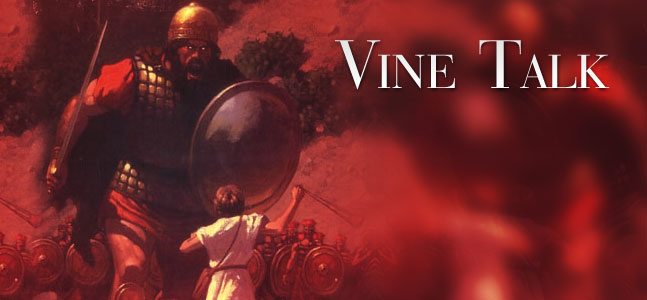
Reuters Life! – The analogy of David and Goliath seemed fitting for this vinous account as many are familiar with the legend and the substance of message in the outcome.
Metaphorically speaking, The Valley of Elah is Singapore.
The Israelites David is represented by modest wine producers at relatively user-friendly prices (sub S$100 per bottle) facing the Philistines mighty Goliath, personified by the most exalted and expensive realms of France.
The setting and participants are perhaps the most notable factors, Singapore being effectively neutral territory in terms of not producing any wine.
Of more relevance are the 20 participants in this exercise, none of whom are wine professionals but a broad representation of nationalities and all well-traveled, relatively wine savvy, open-minded-palates attending a luncheon.
The host of the luncheon — a wine enthusiast who prefers unpretentious, wholesome wines — gave me the opportunity to show wines of unquestionable superiority and emphatic status – no expense spared – against the unassuming and relatively affordable with the caveat that the wines were not too obscure.
To ensure the relevance and impartiality of the exercise, the wines were served with their identity masked and paired with an appropriate dish to bring out the best in them.
I also suggested we employ the wine options tasting format, the entertaining, if not masochistic, sport of identifying masked wines guided by multi-choice questions which culminates in determining a winner or most attuned palate as it were.
Selecting five brackets of two wines, I began by asking each individual which wine they preferred and which they thought was ‘Goliath’. In retrospect, these initial questions had the most relevance in terms of astonishment at the outcome.
LET THE FIGHT BEGIN
The battlefield was set.
As a palate teaser-aperitif, a 2007 Jurtschitsch Gruner Veltliner Kaferberg from Langenlois, Austria, stumped everyone but all agreed a brilliant and intriguing wine.
The first bracket of two chardonnays was the most stupefying, with the group unanimously and emphatically preferring and wrongly declaring ‘Goliath’, a 2006 Neudorf Moutere Chardonnay from Nelson, New Zealand (S$65), slaying a 2006 Domaine Leflaive Puligny Montrachet Les Pucelles Premier Cru (S$240).
Even more astounding if not compelling in its victory, the entire group had thought the New Zealand wine was French.
Round two proved almost as draw-dropping with New Zealand victorious again — a 2006 Felton Road Block 3 Pinot Noir from Central Otago (S$100) annihilating a Domaine Meo Camuzet Clos de Vougeot Grand Cru from Burgundy, France (S$390).
Once again the group had mistakenly declared the more affordable wine ‘Goliath’ and the New Zealand wine as French.
Having lured the group into thinking this was a new world versus old world contest, the third bracket proved to be the most provocative and completely threw all but a few seasoned palates who identified the brooding power and class of a 1st Growth Pauillac, 2004 Chateau Mouton Rothschild (S$560).
Despite its unquestionable prowess the esteemed claret was no match for the 2004 Fontodi Vigna del Sorbe Chianti Classico from Tuscany, Italy (S$95) the consensus declaring this wine ‘Goliath’ and finding it far more complex and completely astounded when they learnt it was a fifth of the price of its opponent.
The gloves were off by the fourth bracket and with the speed of a Muhammad Ali punch a 2006 Rolf Binder Heinrich Shiraz, Mourvedre, Grenache from the Barossa Valley, Australia (S$35) had a 2006 Pierre Usseglio Chateauneuf du Pape Mon Aieul from the Southern Rhone Valley, France (S$148) flat on the canvas.
Whilst there was consensus in preference for the Australian most had recognized its provenance and had deduced the other wine was French and therefore Goliath.
The final bracket emulated the first in its confounding outcome with a 2004 Tschida Chardonnay Trockenbeerenauslese from Burgenland, Austria (half bottle S$59), mortally wounding a reputedly triumphant 2004 Chateau d’Yquem from Sauternes, France (S$388).
Having given the group enough hints to work out one of the wines was Chateau d’Yquem they were stunned when almost everyone mistook and preferred the Austrian for Goliath!
Comparative tastings of this nature should not be considered conclusive and any of these wines served on their own would be most enjoyable.
That said, with a clean sweep in every bracket, ‘David’, was indisputably victorious on this occasion and compelling evidence that without the prejudice of knowing the label, status or rarity of the wine, the correlation between price and tangible quality or perceived enjoyment is highly debatable.
It is also fair to say, in the current climate, wine consumers are looking for more ‘bang for their buck’, and whilst ‘good value’ will always be highly subjective, I firmly believe the best quality/price rapport is to be found in the middle ground or more specifically, the artisan producers who own and concentrate their efforts in the vineyard.
For my part, the whole exercise certainly stirred the wine socialist in me and was enlightening and highly entertaining. To quote a contemplative Don Vito Corleone (as played by Marlon Brando in Godfather, 1972), “Less is more”.
This article was publish in Reuters Lifestyle. All Rights Reserved.
|
|
Tweet |






2 Comments to Can David slay Goliath in the world’s vineyards? | Comments Feed
nice post, i specially enjoy reading about this topic, i hope you can write more following this one
Great work keep it coming
The comments are closed.